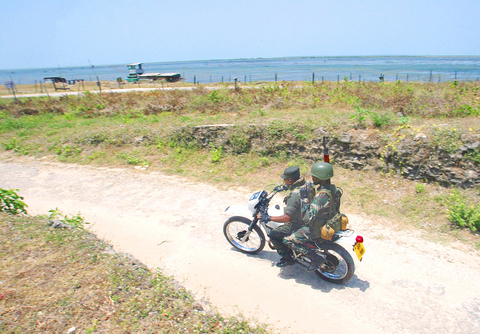Two anti-personnel mines intended to target Sri Lankan military vehicles exploded prematurely yesterday, killing a village guard and wounding two policemen in the country's restive northeast, the military said.
Anti-personnel mines, which can be detonated by remote control, are the preferred weapons of the Liberation Tigers of Tamil Eelam (LTTE) rebels, also known as the Tamil Tigers.
The Media Unit of the Defense Ministry said the guard was killed and policemen hurt near the port town of Trincomalee -- about 230km northeast of the capital, Colombo -- when the mines were triggered. A military convoy was to travel along the road hours later.

PHOTO: AP
Meanwhile, a senior Tamil Tiger rebel leader said yesterday that the spiraling violence in Sri Lanka is worrying and that they are prepared for a resumption of the civil war.
"It is a very worrying situation," Seevaratnam Puleedevan, a top Tamil Tiger said.
"A low intensity war is already going on, there are lot of civilians being killed in the military controlled areas in the whole north east," Puleedevan said. "If the war is thrust upon us then we are ready to retaliate," he said.
Another senior Tamil Tiger leader accused the government of waging an undeclared war on ethnic Tamils.
Speaking at a funeral for four insurgents killed last week in a suicide attack on a government navy patrol boat, senior rebel leader K.V. Balakumaran on Monday accused the military of deliberately targeting Tamil civilians.
"Our people are being blatantly victimized in an undeclared war by the Sri Lanka government armed forces and paramilitaries," Balakumaran said according to pro-rebel Web site TamilNet.
The government has denied targeting civilians, saying its actions were defensive and blamed the Tigers for the surging violence.
In another development, former Tamil Tigers now part of a breakaway group appear to be carrying out attacks and extortion in Sri Lanka's north and probably have army backing, despite denials, international truce monitors say.
The government denies any links to the so-called Karuna group, but the Tigers appear to have retaliated for attacks by ambushing the army. The rebels say Karuna killings must stop before they will come to peace talks.
"I firmly believe that Karuna is going around this area," said Jouni Suninen, head of the district office of the Sri Lanka Monitoring Mission (SLMM) in the northern town of Vavuniya.
"We have eyewitnesses who tell us they have seen Karunas around. I cannot see how they could be operating here without the support of the army," Suninen said.
Former eastern Tiger commander Colonel Karuna Amman split from the mainstream Tamil Tigers in 2004, taking control of much of their eastern territories, but was swiftly pushed out by a Tiger offensive.
His group says they have attacked the rebels in the east, but not the north.
A senior Karuna aide and member of his fledgling political party, the TMVP, said there was no truth to the SLMM reports.
Karuna's powerbase is seen as his home area in eastern Sri Lanka, where the group says it has camps. The government says they are in uncontrolled jungle areas, while the Tigers say they are clearly next to army installations.

VAGUE: The criteria of the amnesty remain unclear, but it would cover political violence from 1999 to today, and those convicted of murder or drug trafficking would not qualify Venezuelan Acting President Delcy Rodriguez on Friday announced an amnesty bill that could lead to the release of hundreds of prisoners, including opposition leaders, journalists and human rights activists detained for political reasons. The measure had long been sought by the US-backed opposition. It is the latest concession Rodriguez has made since taking the reins of the country on Jan. 3 after the brazen seizure of then-Venezuelan president Nicolas Maduro. Rodriguez told a gathering of justices, magistrates, ministers, military brass and other government leaders that the ruling party-controlled Venezuelan National Assembly would take up the bill with urgency. Rodriguez also announced the shutdown

Civil society leaders and members of a left-wing coalition yesterday filed impeachment complaints against Philippine Vice President Sara Duterte, restarting a process sidelined by the Supreme Court last year. Both cases accuse Duterte of misusing public funds during her term as education secretary, while one revives allegations that she threatened to assassinate former ally Philippine President Ferdinand Marcos Jr. The filings come on the same day that a committee in the House of Representatives was to begin hearings into impeachment complaints against Marcos, accused of corruption tied to a spiraling scandal over bogus flood control projects. Under the constitution, an impeachment by the

Exiled Tibetans began a unique global election yesterday for a government representing a homeland many have never seen, as part of a democratic exercise voters say carries great weight. From red-robed Buddhist monks in the snowy Himalayas, to political exiles in megacities across South Asia, to refugees in Australia, Europe and North America, voting takes place in 27 countries — but not China. “Elections ... show that the struggle for Tibet’s freedom and independence continues from generation to generation,” said candidate Gyaltsen Chokye, 33, who is based in the Indian hill-town of Dharamsala, headquarters of the government-in-exile, the Central Tibetan Administration (CTA). It

A Virginia man having an affair with the family’s Brazilian au pair on Monday was found guilty of murdering his wife and another man that prosecutors say was lured to the house as a fall guy. Brendan Banfield, a former Internal Revenue Service law enforcement officer, told police he came across Joseph Ryan attacking his wife, Christine Banfield, with a knife on the morning of Feb. 24, 2023. He shot Ryan and then Juliana Magalhaes, the au pair, shot him, too, but officials argued in court that the story was too good to be true, telling jurors that Brendan Banfield set